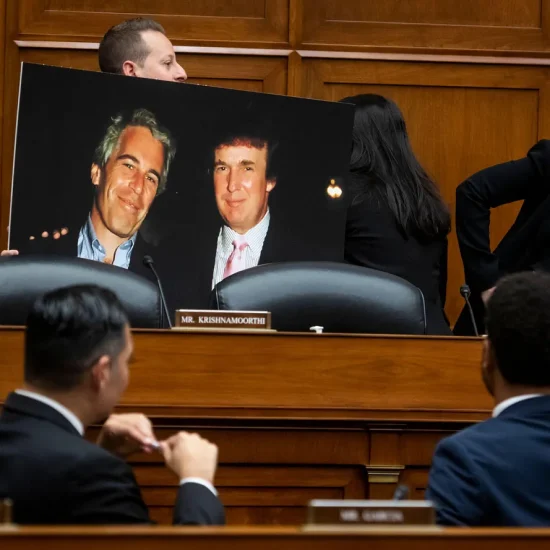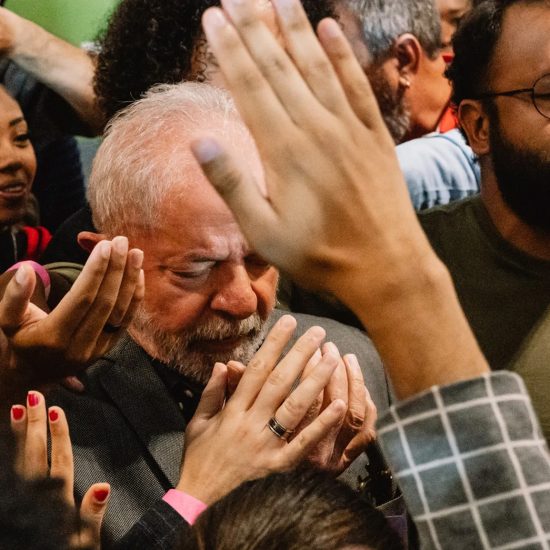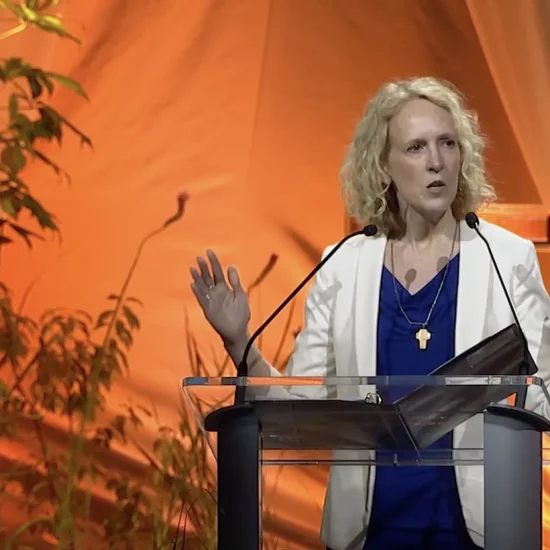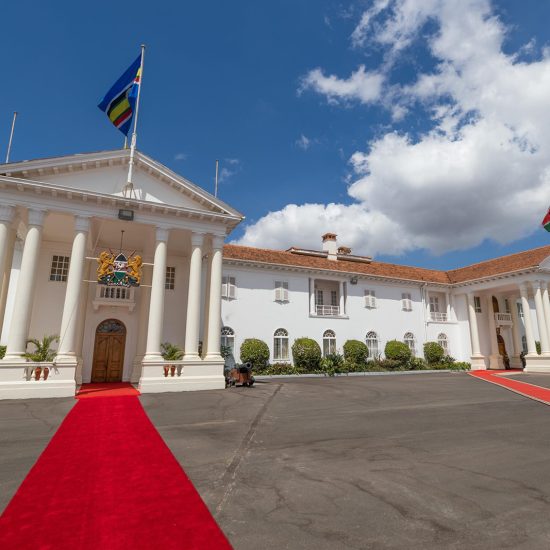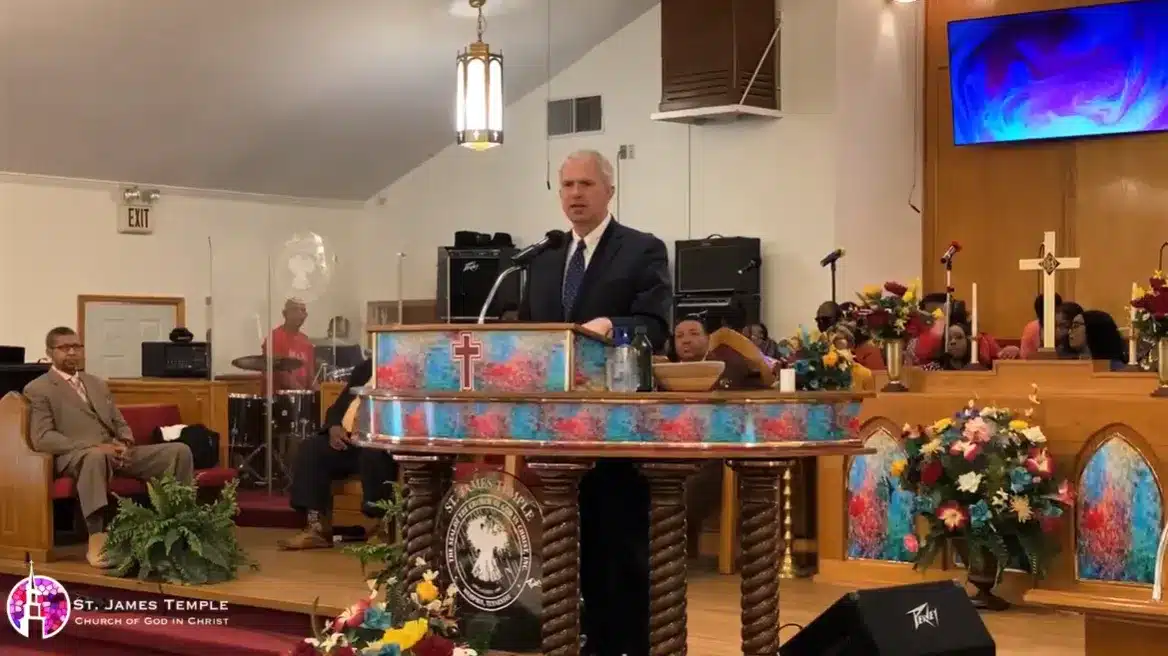
Before Elvis Presley became the king of rock ‘n’ roll, he was singing in church and being influenced by sacred music. Now, one of his second cousins hopes churches can also help launch a Presley into the Mississippi Governor’s Mansion. But while appearing in sanctuaries, the candidate hoping to unseat Republican incumbent Gov. Tate Reeves is singing a partisan tune.
“I’m here because it’s time to turn the page on Tate Reeves,” Democratic gubernatorial nominee Brandon Presley declared Sunday (Sept. 10) from the pulpit of St. James Temple of God in Christ in Ripley. “We’ve got a governor right now that’s interested in pulling us apart.”
That partisan rhetoric continued throughout the candidate’s remarks in the middle of the service as he made a quick stop at the church. The pastor, who called Presley a “special guest,” introduced him as the Democratic gubernatorial nominee and highlighted key policy issues Presley pushes — though the biggest congregational response came at the mention of Brandon’s familial connection to Elvis. The candidate instead highlighted the financial struggles of his family as he grew up.
“Unlike Tate Reeves, I understand where the average family in Mississippi is. I understand what it means to struggle,” Presley said. “When my name goes on the ballot in November, your name goes on the ballot in November.”
“I promise you this, that come election day we’re gonna join arms — Black and White, rich and poor, North Mississippi and South Mississippi — and we’re going to put Tate Reeves number one in the unemployment line,” he added.

Screengrab as Brandon Presley speaks at St. James Temple Church of God in Christ in Ripley, Mississippi, on Sept. 10, 2023.
As one of just three states — along with Kentucky and Louisiana — electing a governor this year, Mississippi’s results will receive outsized attention as media pundits and political strategists try to glean lessons for next year’s presidential, gubernatorial, and congressional races across the country. Thus, the campaign decisions of Presley and Reeves can tell a lot about what the rest of us can expect over the next year in messaging and strategies.
And what does Presley see as the key to pulling off an upset win? Campaigning in churches. He’s spoken in four worship services in just the last three weeks, and many others in the previous months. But as he enters holy spaces, he quickly transforms the services into partisan rallies. So this issue of A Public Witness looks at how the campaign strategy of Presley is all shook up, leaving those of us with suspicious minds about a partisan pulpit crying in the chapel.
Get cutting-edge reporting and analysis in your inbox every week by subscribing today!
Love Me Tender
A Democrat moving into the Governor’s Mansion in Jackson, Mississippi, would be quite a feat. Donald Trump carried the Magnolia State by 17 percentage points in 2020, and an independent poll earlier this month showed Tate running 11 points ahead of Presley. But as a folksy, socially-conservative Democrat with a famous last name, he’s probably the best his party could put forward this year against one of the least popular governors in the country.
“Everything has to go right for Democrats to win in Mississippi,” Ben Jacobs of Vox wrote last month as he wrote about Presley’s campaign. “He has to overwhelmingly win both rural and urban Black voters while winning enough White voters.”
So as Presley, a White politician from a small town in northern Mississippi, strives for a bit of a political miracle, he’s consistently heading to Black churches. As he does, he weaves together faith references with his partisan attacks.
“We got good people in this state. We have been divided long enough. We have been confused long enough,” Presley declared on Aug. 27 at Greater Mt. Sinai Missionary Baptist Church in Jackson. “There’s an old saying in politics: ‘If you can’t convince them, confuse them.’ And the other side’s done a great job of doing that for a long time. But ‘God is not the author of confusion.’ And we’re not going to be confused come November.”
“I’m a man of faith. And I got faith that we’re going to win this election. I got faith that there’s 51% at least in this state that wants to see a change. But ‘faith without works is dead.’ So I can have all the faith in the world … but we also have to do the work,” he added to multiple outbursts of affirmation from the congregation. “Come election day in November … we’ve got to show up, we got to show out, and we got to show the world that Mississippi can come together, that we can put down the battles of the past. And like that line in ‘Amazing Grace’: ‘Once was blind but now I see.’”
The same morning he spoke at Greater Mt. Sinai, he also made remarks during the service at Farish Street Baptist Church in Jackson. At that church, however, he wasn’t invited to a pulpit but instead just allowed to speak from a pew (off-camera during the livestream). The briefest of his remarks in recent services, he still focused on accusing Reeves of dividing the state on racial lines.
In addition to the three recent Sunday morning campaign stops during church services, he also spoke during a Wednesday night service at John the Baptist Missionary Baptist Church in Columbus on Sept. 6. And his campaign regularly posts pictures on social media of Presley speaking in churches.

Brandon Presley speaks at Farish Street Baptist Church (left) in Jackson, Mississippi, on Aug. 27, 2023, and at John the Baptist Missionary Baptist Church (right) in Columbus, Mississippi, on Sept. 6, 2023. (Presley social media posts)
This isn’t a new strategy for Presley. He’s been stopping in churches for months as he courts voters. For instance, he spoke on July 30 during a service at Mt. Hope Missionary Baptist Church in Taylor. During his remarks, he even took a shot at the faith of his opponent: “We have a chance not just to have a governor that can read a scripture — you know Satan knows the scripture — but also a governor that understands what it is and what we need to do … and what we should be doing for ‘the least of these.’”
And on July 23, Presley attended New Hope Baptist Church in Jackson. The congregation’s pastor, Rev. Jerry Young, is president of the National Baptist Convention USA, the largest Black Baptist denomination in the country. Presley didn’t speak at that church, but he was called to stand up during the service. A leader in the congregation introduced him, praised his campaign, and urged congregants to vote in the primary that was coming up in two weeks.
“Today’s challenge for you is to not just vote as a New Hope member, but to tell somebody, take somebody, get somebody with you to go vote,” the church leader said. “When I met Mr. Presley, he said to me, ‘well, my pastor says if you name it you can claim it.’ So he’s claiming this governor’s race this time, and he knows he needs New Hope to help support.”
“I’m with a man that ain’t scared,” she added after reading an attack on Reeves from Presley’s campaign material. “Thank you very much, and go vote!”
The Presley campaign did not respond to Word&Way’s request for comment about his partisan campaigning during church services.
Return to Sender
During his church campaign stops, Presley regularly mentions his membership at a Methodist church near his home in Nettleton and invites people to come visit if they ever find themselves in the area on a Sunday. But he also often acknowledges what makes him different from those in the sanctuaries he briefly visits.
“I’m White and I’m country and there ain’t anything I can do about it,” he joked at Farish Street on Aug. 27 as he talked about his goal of bringing people together across racial lines.
In multiple services, Presley also addressed the issue of White politicians like himself campaigning in Black churches. He said at Greater Mt. Sinai on Aug. 27, “I’m asking for your help. I know a lot of times White politicians show up in Black churches and they just show up election years. I’m not that type of person. I want to come back after we win this election.”
He makes a good point about election year visits by Democrats to Black churches (and by Republicans to White evangelical congregations). However, coming back as governor (with an eye on reelection) doesn’t completely fix the problem. The damage is already being done.
With his partisan rhetoric during worship services, Presley has put multiple churches in violation of IRS tax rules governing nonprofits. This is a problem we’ve reported on in multiple campaign cycles involving candidates in both parties. That included both Republicans and Democrats last year. Partisan politicking during church services is a bipartisan problem, though in the Mississippi gubernatorial race Presley is the more common violator.
But the problem isn’t merely the tax-exempt status of congregations that could be at risk if the IRS was willing to actually enforce the rules. Even if the IRS rules didn’t exist, there would still be a problem with Presley transforming worship services into partisan campaign rallies.
Presley’s rhetoric mixing biblical quotes with partisanship particularly shows the problem. For instance, the line he drew from 1 Corinthians 14 about God not being the author of confusion is not about politicians trying to confuse people. It’s actually about avoiding disruption during worship services. It’s about making sure people are speaking words from God and not having too many people talking about too many different things. Like maybe a politician pushing partisanship during a service!
It’s one thing for churches to confront injustice and corrupt policies. It’s another to conflate one political party with Christ’s Kingdom, to raise voting a certain way as a test of Christian faithfulness.
And that’s why we’ll continue to call out politicians in both parties for partisan pulpit moments. With the Mississippi race as a forbearer of things to come in many more races in 2024, churches need to be diligent now before the politicians come to serenade us. It’s now or never. Both the Baptist Joint Committee for Religious Liberty and the U.S. Conference of Catholic Bishops have put out guides to help churches think about what they should and shouldn’t do.
Even when it comes to candidates we like, it’s important that we don’t allow our houses of worship to become political pawns. Over the next year, we’ll need to remain vigilant. Or else we might fall for the devil in disguise.

As a public witness,
Brian Kaylor

Read earlier reports in “The Partisan Pulpit” series from A Public Witness:
- Florida 2022 Gubernatorial Campaign
- Georgia 2022 Gubernatorial Campaign
- Maryland 2022 Gubernatorial Campaign
- Illinois 2022 Gubernatorial Campaign
- Pennsylvania 2022 Gubernatorial Campaign
- Ohio 2022 U.S. Senate Campaign
- Georgia 2022 U.S. Senate Campaign
- North Carolina 2022 U.S. Senate Campaign (with a follow-up)
- Virginia 2021 Gubernatorial Campaign
- California 2021 Recall Gubernatorial Campaign

